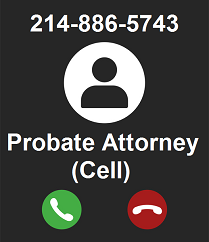Probate: 469.708.6050
Wills & Guardianship: 214.227.6400
13355 Noel Rd., Ste. 1100
Dallas, Texas 75240
Locate the Original Will
The executor's first task in probating any will is to locate the original will. If the executor is not already in possession of the original will, he or she should check in the following places:
Decedent's financial papers in the home - Usually, people store their will in the same location as other important papers such as life insurance policies, birth certificates, and other financial documents. A thorough search of the decedent's home should be undertaken immediately after the decedent's death.
Safe Deposit Boxes - People sometimes store their financial papers in a safe deposit box. Gaining access to the box can be a problem if the decedent did not authorize anyone else to access to the box. If the decedent's bank refuses to grant access to the box, you must then file an application with the court having jurisdiction of the decedent's estate in order to gain access to the box. The application must show that: (1) the bank leased a safe deposit box to the decedent, and (2) the safe deposit box may contain the decedent's will, a deed to a burial plot in which the decedent is to be buried, or an insurance policy issued in the decedent's name and payable to a beneficiary named in the policy. If the decedent did not say whether he or she had a safe deposit box or disclose its location, you can try looking through the decedent's bank statements for a yearly charge for a safe deposit box. If you do not have a key, then the bank will charge an extra fee to drill the box open.
County Clerk - A testator may also deposit his or her original will with the county clerk. The county clerk keeps an index of all wills deposited with the clerk. In order to probate the will, the executor can file an application for probate of will with the clerk. If the executor or family member does not have a copy of the will, then he or she must submit an affidavit to the clerk stating that the testator has died. The clerk will then notify the named executor that the will is on deposit in the clerk's office.
Decedent's Attorney - Some estate planners store their clients' wills for them, either as a service or as an attempt to gain the executor's business after the testator's death. You may want check with the testator's attorney to see if he or she retained the original will. By retaining custody of the will, the drafting attorney took on an affirmative duty to deliver the will to the executor or the probate court upon learning of the death of the testator. You should not have to pay the attorney any fees for this service as the attorney is required to do this under the Texas Estates Code. The Duran Firm has not had any problems convincing an attorney holding the will to release it to the clerk or the executor. The law is clear in this regard. Furthermore, the executor is not obligated to use the testator's attorney when probating the decedent's will.
Uncooperative Family Member - By law, upon receiving notice of the death of a testator, any person having custody of the will must deliver it to the executor named in the will or the clerk of the court which has jurisdiction of the estate. If an uncooperative person refuses to surrender the will to the executor or the probate court clerk, the court can force that person to appear before the judge and show cause why the person should not deliver the will to the court or the executor for probate.
© 2016-2023 Duran Firm, PLLC
All rights reserved.













